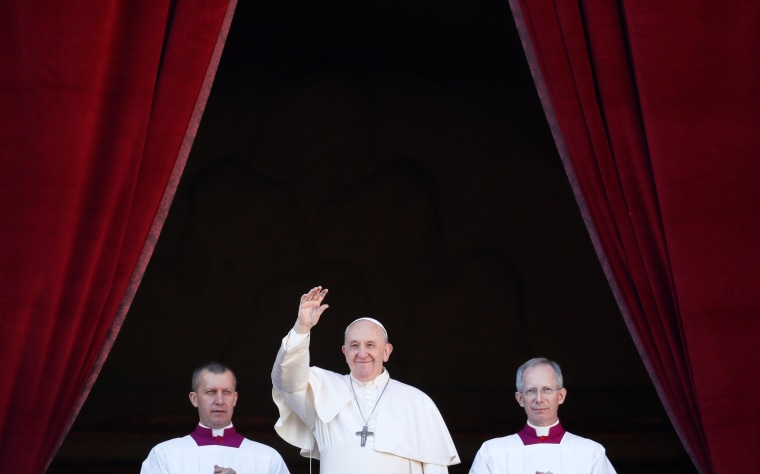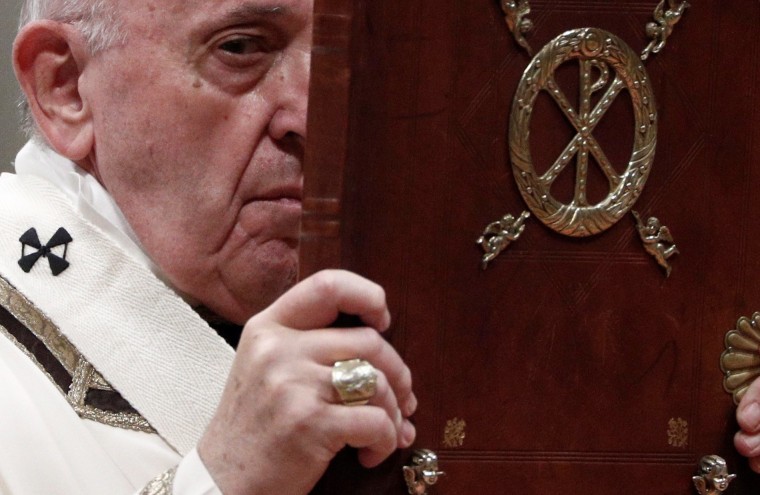Pope Francis called for "the light of Christ" to pierce the "darkness of human hearts" that fuels religious persecution, social injustice and violence during his traditional Christmas Day message on Wednesday.
"There is darkness in personal, family and social relationships, but the light of Christ is greater. There is darkness in economic, geopolitical and ecological conflicts, yet greater still is the light of Christ," the 83-year-old pontiff said.
During his "Urbi et Orbi" (to the city and the world) address to tens of thousands of people in St. Peter's Square in Vatican City, and millions watching or listening around the world, the pope called for peace and stability to the Holy Land, Syria, Lebanon, Yemen, Iraq, Venezuela, Ukraine, the Democratic Republic of Congo and several West African nations.
He also highlighted the plight of refugees and migrants.
"It is injustice that makes them cross deserts and seas that become cemeteries. It is injustice that forces them to endure unspeakable forms of abuse, enslavement of every kind and torture in inhumane detention camps," he said.

"It is injustice that turns them away from places where they might have hope for a dignified life, but instead find themselves before walls of indifference," the pope added.
The message of peace followed the pope's appeal to the world's 1.3 billion Roman Catholics to "take courage" and not let the Church's failings drive them away.
"Christmas reminds us that God continues to love us all, even the worst of us," Francis in his Christmas Eve sermon.
Thousands attended the sermon held at St. Peter's Basilica to mark the night that Jesus was born in Bethlehem.
Without discussing specifics, Francis referred to the Church's recent troubles — ongoing sexual abuse scandals that have shaken the institution around the world along with financial irregularities at the Vatican.
"Whatever goes wrong in our lives, whatever doesn't work in the Church, whatever problems there are in the world, will no longer serve as an excuse. It will become secondary, for faced with Jesus' extravagant love, a love of utter meekness and closeness, we have no excuse," he said on Tuesday.
His comments come after a warning to Vatican bureaucrats on Saturday to embrace change, which included the abolishment of "pontifical secrecy" that previously protected the Church in the sexual abuse scandal.
He told cardinals, bishops and priests that the "rigidity" in living out the Christian faith was creating a "minefield" of hatred and misunderstanding in a moment where Christianity is losing its relevance.
“Today we are no longer the only ones that produce culture, no longer the first nor the most listened to," he had said. “The faith in Europe and in much of the West is no longer an obvious presumption but is often denied, derided, marginalized and ridiculed.”
But change may be coming too late for many victims.
On Saturday, the Legion of Christ religious order announced it identified 33 priests and 71 seminarians who had sexually abused minors over the past eight decades. A third of the priestly abusers were also themselves victims of the Legion's late founder, the Rev. Marcial Maciel.
Amid the findings, Francis accepted the resignation of the Legion's defender at the Vatican, Cardinal Angelo Sodano, who had for years blocked investigations into the sex abuse allegations despite the Vatican having documented evidencefrom the 1940s that suggested Maciel was a drug addict and pedophile.
Days earlier, the pope also accepted the resignation of Luigi Ventura, the Vatican's ambassador to France, who faces accusations of molesting a male employee of the city of Paris.
